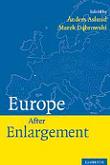Europe after Enlargement
 In May 2007, Cambridge University Press published a book containing a collection of essays based on the outcome of CASE's 2005 international conference held in Warsaw. In this collection, several prominent European economists discuss the five big challenges to the development of the European Union (EU). These are: the new European Constitution, European finances and the Euro, the need to boost economic growth, competition in both new member states and countries further to the East, and the goal of forming a cooperative and productive relationship with countries on the European periphery.
In May 2007, Cambridge University Press published a book containing a collection of essays based on the outcome of CASE's 2005 international conference held in Warsaw. In this collection, several prominent European economists discuss the five big challenges to the development of the European Union (EU). These are: the new European Constitution, European finances and the Euro, the need to boost economic growth, competition in both new member states and countries further to the East, and the goal of forming a cooperative and productive relationship with countries on the European periphery.
The book includes essays by Charles Wyplosz, who argues that enlargement and deepening are not substitutes but complements;
Vito Tanzi who questions the Keynesian foundation of the Growth and Stability Pact;
Daniel Gros, who criticises the achievements within the Lisbon Agenda; and
Anders Aslund, who claims that Russian and Ukrainian oligarchs differ little from US 'robber barons'.
The final two chapters touch on the EU's European Neighbourhood Policy and long-term economic integration in Eurasia.
Contents
1. Has Europe lost its heart; 2. Economic implications of the social provisions of the stalled EU constitution; 3. Fiscal policy and fiscal rules in the European Union; 4. Design and implementation of the stability and growth pact: the perspective of new Member States; 5. Perspective on the Lisbon strategy: how to increase European competitiveness; 6. Is Europe reforming: Evidence from cross-country structural indicators; 7. Recovery growth as a stage of post-socialist transition; 8. Comparative oligarchy: Russia, Ukraine and the United States; 9. The economic rationale of the 'European neighborhood policy'; 10. Economic integration of Eurasia: opportunities and challenges of global significance.
Reviews
"A pantheon of economic thinkers grapples with the problems facing Europe. No longer about East vs. West or even rich vs. aspiring, the issue now is whether all of Europe can stay (relatively) rich while it ages. As the authors make clear, for really dealing with this complex problem and all its facets, it's much later than you think." -- Simon Johnson, Sloan School of Management, MIT
"Enlargement has irreversibly transformed the European Union and this must lead to a rethinking of its principles and policies. Aslund and Dąbrowski offer analyses, ideas and proposals that cover a wide range of issues. This is a most welcome contribution to the debate on the course the new Europe should take in the years to come" -- Jean Pisani-Ferry, Director of Bruegel, Brussels
"This book discusses - in a profound and transparent way - many important topics, e.g. EU constitution, aging, fiscal rules, economic growth in the European countries. It usefully covers EU-IS, New Members as well as Eurasia." -- Leszek Balcerowicz, President, National Bank of Poland
For a complete review of the book, see Neal, Larry. Rev. of Europe after Enlargement, Anders Aslund and Marek Dabrowski (eds.). Slavic Review 67(3) (Fall 2008): 736-8
This book is also available in paperback edition. Please visit the website of Cambridge University Press.
